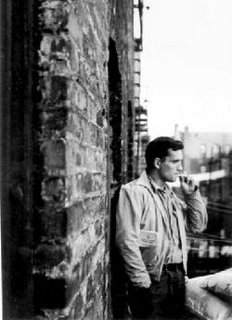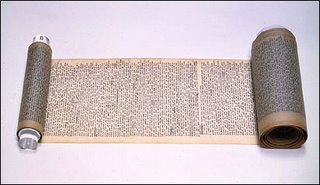CROSSROADS COMMENT -- Nearly Translucent
 As Sal Paradise says: "life is holy and every moment is precious," which explains why Dean "seemed to be doing everything at the same time." –Jack Kerouac, On the Road, first published in 1957
As Sal Paradise says: "life is holy and every moment is precious," which explains why Dean "seemed to be doing everything at the same time." –Jack Kerouac, On the Road, first published in 1957In what ways do novels read fifty years ago remain important to us?
Lacking the file cabinet memory of a Jacques Barzun or a Harold Bloom, plot lines and meanings of major works can turn into a tangle of knots and loose threads–lumpy highlights, the flash of a name, a few hazy scenes vaguely recalled.
We’ve all experienced this graying of a past color burst reading experience. The cold eye of the present inserts itself between the warm ache for yesterday’s enchantment. Our reading of reading memories becomes an exercise in mental acrobatics. What we devoured with a straightforward hunger yesterday is forced to jump through hoops today. Enlightenment gained wobbles precariously, swaying against the stolid reasoning of the now. Power is lost. Light dimmed.
So what is left to trust when we open our mind’s eye to an important reading memory?
This question occurred to me as I read Jenna Russell’s story in the The Boston Globe on the unfurling of the scroll of paper Jack Kerouac used when writing his now classic Beat Generation novel, On the Road. The story leads with this: “It's literary legend, how Jack Kerouac wrote his breakthrough novel On the Road in a three-week frenzy of creativity in spring 1951, typing the story without paragraphs or page breaks onto a 119-foot scroll of nearly translucent paper.”
That “nearly translucent” buzzed me through the doors of my memory bank and provided all I really need to remember about Kerouac’s unlikely, timely masterpiece.
Nearly fifty years ago I was sitting in a blazingly bright all night restaurant on the southwest side of Chicago. It was either the The Beacon or The Wheel, two favorite haunts. My copy of On the Road sat next to a piece of apple pie and ice cream. I somehow remember today these staples of American life were Kerouac's favorite forms of secular communion. The pie was dished up by a tired waitress with a frilly handkerchief in her breast pocket. She called me “hon.” She asked me what I was reading. I stammered my answer then and I stammer it now.
But what remains clear is that for a long moment during those Nighthawk nights at the equally well-named Beacon or The Wheel life understood through this book seemed to turn “nearly translucent.”
Then the military draft got me and the moment was lost for two years and a lot more after that.

Labels: Beat Generation, Chicago 1958, Kerouac


3 Comments:
Gary,
You write very well. It makes me wonder why you like "On the Road" or any of Kerouac's trash.
Are you familiar with "Ex-Friends" by Norman Podhoretz? He was a friend of Jack's and Allen's (Ginsberg) the Beat Generation icons.
In Partisan Review Pod wrote that Kerouac's "prosidy" (Allen's word) was a cover for his "simple inability to express anything in words." And the same "poverty of resources" was apparent in his treatment of character and plot.
I once saw Jack at a book store in Sausalito. It was early 1961. He and Lawrence Ferlinghetti were singing the praises of Che and Fidel. I was entranced... but eventually I grew up.
The Beats were bums, and Kerouac was an untalented bum!
Yeah, Bill, "The Beats were bums . . . ," and proud of it. They embraced the romance of the road and freedom from a gray 1950s time clock/organization man exisistence. This didn't necessarily make them better people; it certainly didn't make Kerouac a better writer. (Was it Capote who read K's novels and concluded, "That's typing not writing.") But don't we all play at being "Beats," or what we envision the Beats to be, today? We just make sure we take along our American Express cards when we get out on the highway, or find a B & B on Big Sur, or rent a cabin in the Cascades, or even walk into a Starbucks and order an expresso.
Their politics? I would just say they were on the side of life, supporters of dingy sunflowers you might wander onto along a railroad siding.
OK Gary, we agree the Beats were bums, and maybe proud of it. But what they really embraced were drugs, promiscuity, homosexuality, communists and anti-Americanism.
The "romance of the road and freedom from a gray 1950s time clock/organization man exisistence" were just excuses for being bums and perverts.
You are right that some of us "play at being Beats." I visited my son in Mill Valley last year and we went to the street fair in Sausalito. There they were, greying 1960s-era hippies with their long hair in ponytails, wearing Armani clothes and driving SL500 Mercedes. Pathetic! I'll bet they all voted for Kerry too.
Post a Comment
<< Home